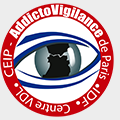The Parisian Center of Evaluation and Information on Pharmacodependence and Addictovigilance (CEIP-A) is a center specialized in monitoring of addiction problems, covering two big French regions which are Ile de France and Centre-Val de Loire.

The CEIP is located at Fernand Widal Hospital in Paris – France
French Network of Addictovigilance (FAN)
CEIP-A has been created in 1990 and was defined in 1999 by the Code of Public Health (CSP article R.5132-97 à R.5132-116).
This French network, operating under the tutelage of French National Agency for Medicines and Health Products safety (ANSM), is composed by 13 centers, specialized on pharmacology, addictology, toxicology or epidemiology

Missions of the French Network of Addictovigilance
- Collection and evaluation of drug dependence, drug abuse or psychoactive substances misuse cases, with the exception of alcohol and tobacco…
- Evaluation of the potential of abuse, dependence or misuse from medicines and non-therapeutical substances
- Research on the pharmacodependence
- Identification of risks for Public Health
- Set up expertise and advices for the Ministry of Health and Solidarity
- Provide information and prevention (professionals, public) on pharmacodependence
IDENTITY CARD – CEIP OF PARIS
Population of the intervention territory (INSEE data of 2014) is the most important of the FAN.
Total population in two regions: 14 582 551 inhabitants (Ile de France: n = 12 005 077 and Centre / Val de Loire: n = 2 577 474)

The notification
The notification is a reporting system by health professionals or individuals (users, patients, socio-educational structures, …) of adverse events occurring with a drug or cases of dependence, abuse and misuse of psychoactive drugs. The notification is a description of the consumption patterns and the psychoactive substances involved (name, dosage, route of administration, duration of consumption). Data collected are anonymised and evaluated for purposes of research and health monitoring (addictovigilance).
The objective is to better understand the addictive liability and the harmfulness of psychoactive substances used, and also to analyze emerging phenomena (new drugs, new practices …). Our mission is part of an initiative to improve public health, prevention and harm reduction.
Who can notified to CEIP ?
· Health care professional who face cases of substance use disorders (dependence, abuse or misuse): physician, pharmacist, dentist, midwife, physiotherapist, nurse, psychologist.
· Drug users with a substance use disorder or seeking information on psychoactive drugs (effects, toxicity, adverse event, kineytics) or requiring therapeutic care (medical orientation in addictology, psychiatry).
· Entourage of a user who presents a substance use disorder (information on addiction, drug use and advice on medical care).
Specific surveys
Some surveys are conducted by FAN under coordination of one responsible center.

The Parisian CEIP-A is in charge of the NATIONAL SURVEY ON CHEMICAL SUBMISSION or DRUG-FACILITATED CRIMES
Since 2003, the French National Agency for Medicines and Health Products safety implanted a plan of observation via the CEIP of Paris:
This multicenter study is designed to identify cases of drug-facilitated crimes, the substances used and the modus operandi. It is based on data collection from victims consulting for suspected assault in a context of amnesia suggestive of drug-facilitated crime or subjects claiming to have been drugged without their knowledge.
OPEMA
OPEMA (Observation des Pharmacodépendances En Médecine Générale) is a national pharmaco-epidemiological study, conducted in collaboration with general practitioners in out-patient. It collects information on the modalities of the psychoactive substance consumption by patients with substance use disorder and it also provides data on health issues. This study is repeated every year in November.
OPPIDUM
OPPIDUM (Observation of illegal drugs and misuse of psychotropic medications) is an annual, cross-sectionnal national pharmacoepidemiological study repeated every year in October. This survey collects information on psychoactive substance use and diverted medications observed in patients consulting in specialized care centers on drug dependence.
DRAME
DRAME (Décès en Relation avec l’Abus de Médicaments Et de Substances) is an annual survey that identifies the psychoavtive substances involved in death by overdose or by a complication related to the substances used. This study requires the collaboration of expert forensic analysts in toxicology.
OSIAP
OSIAP (Ordonnances Suspectes Indicateur d’Abus et de Pharmacodépendance) is an identification of drug abuse by means of falsified prescriptions (copy, theft of prescriptions, falsification from a word processor) presented to dispensing pharmacies. The main goal of this survey is to identify drugs liable to be diverted and to determine the rank of most diverted drugs when compared with sales data. This survey is held every year during the months of May and November by collaboration of sentinel network of pharmacists, coordinated locally by CEIP-A.
ASOS
ASOS (Antalgiques Stupéfiants et Ordonnances Sécurisées) is intended for pharmacist practicing in drugstore, and concerns narcotic analgesics and secured prescription. It is an annual cross-sectional study which describes the population treated with painkillers. Objectives are to assess the proper prescribing practices of those medicines.
The team of CEIP Paris is composed of physician and pharmacists
Dr Samira DJEZZAR: Physician head of the Center
Dr Anne BATISSE: Pharmacist -Toxicologist
Dr Leila CHAOUACHI: Pharmacist
Dr Laura BECERRA: Pharmacist

